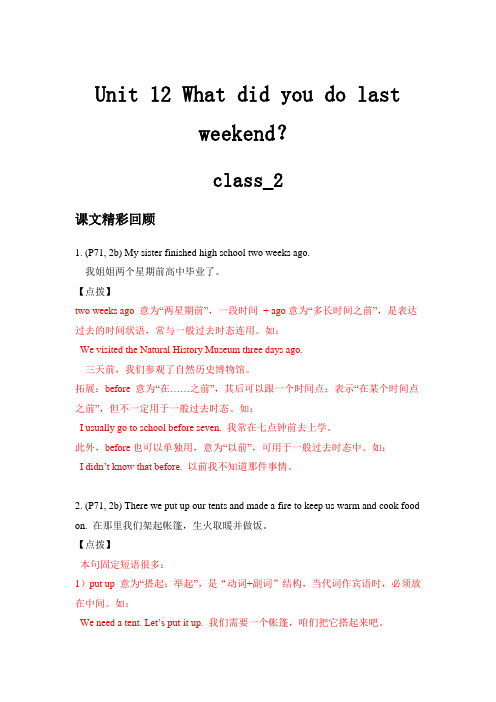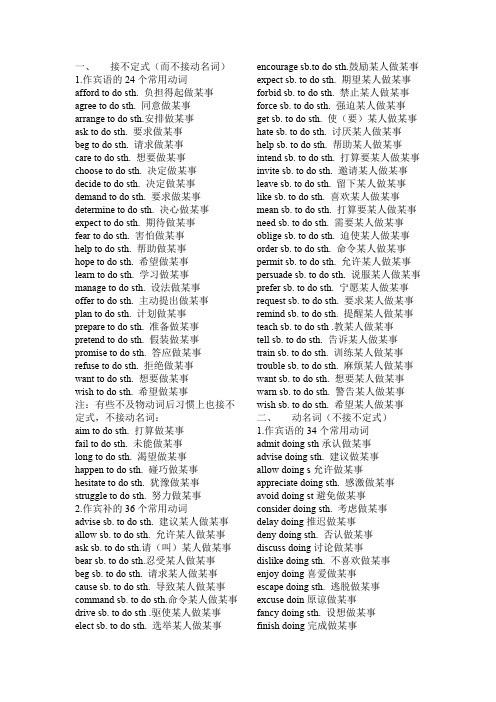start-to-do-sth-与start-doing-sth的区别
八年级英语语法知识点归纳总结

八年级英语语法知识点归纳总结要想取得好的学习成绩,必须要有良好的学习习惯。
习惯是经过重复练习而巩固下来的稳重持久的条件反射和自然需要。
建立良好的学习习惯,就会使自己学习感到有序而轻松。
接下来是小编为大家整理的八年级英语语法知识点归纳总结,希望大家喜欢!八年级英语语法知识点归纳总结一He said I was hard-working.重点语法:宾语从句结构:主语 + 谓语动词 + 宾语从句(主语 + 谓语动词 + 宾语/表语)例句:----Im good at English. He says. (改为加宾语从句的复合句)----He says Im good at English.注意:①主句是一般现在时态,宾语从句的时态不受其影响。
例句:He says Im good at English now.He says I was good at mathematics when I was young.②主句是过去时态,宾语从句也要用过去时态。
例句:He said I was good at mathematics when I was young yesterday.He said I was good at English now yesterday.③宾语从句是客观真理时永远用一般现在时态。
例句:Our teacher says 24 hours make a day.Our teacher said the sun gives us so many energy yesterday.④动词原形不能作主语,必须用其 -ing 形式。
例句:She said helping others changed her life.重点短语:direct speech 直接引语reported speech = indirect speech 间接引语first of all = at first 首先pass on 传递be supposed to do sth. 应该做某事be good at = do well in 在某方面做得好in good health 身体健康get over 克服open up 打开care for = take care of = look after 照料;照顾not any more = not any longer = no longer 不再have a cold 感冒end-of-year exam 年终考试get nervous 变得紧张forget to do sth. 忘记做某事(该事未做)forget doing sth. 忘记做某事(该事已做)its + adj. + [for sb.] + to do sth. 做某事[对某人来说](加形容词) context 上下文Reading Strategy(阅读方法)First read for meaning, not for detail. (首先理解文段的大致意思,不在于文段的细节部分。
初中英语动词+to-do和+doing的用法

初中三年全部英语动词+doing和+to do 句型全汇总!在初中英语学习中,想要取得高分语法和单词这两座大山一定要过,今天分享的是初中英语最常考全部英语动词+doing和+to do 的总结,同学们可以抽时间好好记熟这些,千万别再弄混了.一、带动词ing形式1. keep doing坚持做某事2。
keep sb. doing使某人一直做某事3。
practise doing sth.练习做某事4。
enjoy doing喜欢做某事5. finish doing完成做某事6。
be afraid of doing 害怕做某事be busy doing 忙于做某事7. look forward to doing盼望做某事8. how about doing、。
/what about doing做某事怎么样9。
spend some time (in)doing花时间做某事10。
spend some money (in)buying 花钱做某事11。
feel like doing想做某事12。
stop/keep/prevent …from doing阻止某人做某事13. thank sb for doing感谢某人做某事14. thanks for doing感谢做某事15. do somecooking/cleaning/reading/shopping/washing做点饭、打扫一下卫生、读点书、逛逛街、洗洗衣服16。
go swimming/fishing/shopping/skating/boating去游泳、钓鱼、逛街、滑冰、划船17. mind doing介意做某事18。
can't help doing情不自禁做某事19. consider doing考虑做某事20. have fun doing sth.。
做某事有趣21. have difficulty doing sth做某事有困难have trouble doing sth做某事有困难have problem doing sth 做某事有困难22. waste time/money doing浪费时间或金钱做某事23. instead of doing代替做某事24。
八上英语动词后加to do和doing有不同意思的动词归纳

八上英语期末复习动词后接to do sth 或doing sth.的区别1、begin / start to do sthbegin / start doing sth.1) 谈及一项长期活动或开始一种习惯时,使用doing.How old were you when you first started playing the piano? 你几岁时开始弹钢琴?2) begin, start用进行时态时,后面动词用不定式to doI was beginning to get angry. 我开始生起气来.4) 物作主语时It began to melt.2 mean to doing/to domean to do 打算、想mean doing 意味着I mean to go, but my father would not allow me to. 我想去,但是我父亲不肯让我去.To raise wage means increasing purchasing power. 赠加工资意味着增加购买力.3.be interested doing/to dointerested to do 对做某事感兴趣,想了解某事. interested in doing 对某种想法感兴趣,doing 通常为想法.I shall be interested to know what happens.我很想知道发生了什么事. (想了解)I'm interested in working in Switzerland. Do you have any idea about that?我对在瑞士工作感兴趣.你想过这事吗? (一种想法)4.be afraid doing/to dobe afraid to do 不敢,胆怯去做某事,是主观上的原因不去做,意为"怕";be afraid of doing 担心出现doing的状况、结果. doing 是客观上造成的,意为"生怕,恐怕".She was afraid to step further in grass because she was afraid of being bitten by a snake.她生怕被蛇咬着,而不敢在草丛中再走一步.She was afraid to wake her husband.她不敢去叫醒她丈夫. She was afraid of waking her husband.她生怕吵醒她丈夫.5.go on doing/to dogo on to do 做了一件事后,接着做另一件事.go on doing 继续做原来做的事.After he had finished his maths,he went on to do his physics. 做完数学后,他接着去做物理.Go on doing the other exercise after you have finished this one.作完这个练习后,接着做其他的练习6.try doing/to dotry to do 努力,企图做某事.try doing 试验,试着做某事.You must try to be more careful. 你可要多加小心.I tried gardening but didn't succeed.我试着种果木花卉,但未成功.9.remember doing/to doremember to do 记得去做某事(未做) remember doing 记得做过某事(已做)Remember to go to the post office after school.记着放学后去趟邮局.Don't you remember seeing the man before?你不记得以前见过那个人吗?10.forget doing/to doforget to do 忘记要去做某事. (未做)forget doing 忘记做过某事. (已做)The light in the office is stil on. He forgot to turn it off.办公室的灯还在亮着,它忘记关了.(没有做关灯的动作)He forgot turning the light off.他忘记他已经关了灯了. ( 已做过关灯的动作) Don't forget to come tomorrow.别忘了明天来. (to come动作未做)典型例题---- The light in the office is still on.---- Oh,I forgot___.A. turning it offB. turn it offC. to turn it offD. having turned it off答案:C.由the light is still on 可知灯亮着,即关灯的动作没有发生,因此用forget to do sth.而forget doing sth表示灯已经关上了,而自己忘记了这一事实.此处不符合题意.11.stop doing/to dostop to do 停止,中断做某事后去做另一件事. stop doing 停止做某事.They stop to take some photos. 他们停下来,照了几张像。
五年级英语非谓语动词造句单选题40题

五年级英语非谓语动词造句单选题40题1. I want ______ a book after school.A.readB.to readC.readingD.reads答案:B。
want to do sth 是固定用法,表示“想要做某事”。
A 选项read 是动词原形,不能直接放在want 后面;C 选项reading 是现在分词,一般和be 动词搭配表示正在进行的动作;D 选项reads 是第三人称单数形式,也不符合want 的用法。
2. She hopes ______ a good student.A.beB.to beC.beingD.is答案:B。
hope to do sth 表示“希望做某事”。
A 选项be 是动词原形,不能直接放在hope 后面;C 选项being 是现在分词,hope 不和being 搭配;D 选项is 是第三人称单数形式,也不符合hope 的用法。
3. We plan ______ a picnic this weekend.A.haveB.to haveC.havingD.has答案:B。
plan to do sth 表示“计划做某事”。
A 选项have 是动词原形,不能直接放在plan 后面;C 选项having 是现在分词,plan 不和having 搭配;D 选项has 是第三人称单数形式,也不符合plan 的用法。
4. He decides ______ his homework first.A.doB.to doC.doingD.does答案:B。
decide to do sth 表示“决定做某事”。
A 选项do 是动词原形,不能直接放在decide 后面;C 选项doing 是现在分词,decide 不和doing 搭配;D 选项does 是第三人称单数形式,也不符合decide 的用法。
5. They start ______ English songs.A.singB.to singC.singingD.sings答案:B。
人教版初一下英语Unit12B课文回顾重点分析及测试题解析

Unit 12 What did you do lastweekend?class_2课文精彩回顾1. (P71, 2b) My sister finished high school two weeks ago.我姐姐两个星期前高中毕业了。
【点拨】two weeks ago 意为“两星期前”,一段时间+ ago意为“多长时间之前”,是表达过去的时间状语,常与一般过去时态连用。
如:We visited the Natural History Museum three days ago.三天前,我们参观了自然历史博物馆。
拓展:before 意为“在……之前”,其后可以跟一个时间点;表示“在某个时间点之前”,但不一定用于一般过去时态。
如:I usually go to school before seven. 我常在七点钟前去上学。
此外,before也可以单独用,意为“以前”,可用于一般过去时态中。
如:I didn’t know that before.以前我不知道那件事情。
2. (P71, 2b) There we put up our tents and made a fire to keep us warm and cook food on. 在那里我们架起帐篷,生火取暖并做饭。
【点拨】本句固定短语很多:1)put up 意为“搭起;举起”,是“动词+副词”结构,当代词作宾语时,必须放在中间。
如:We need a tent. Let’s put it up. 我们需要一个帐篷,咱们把它搭起来吧。
If you have any questions, please put up your hands.如果你有什么问题,请举起手来。
2)make a fire意为“生火”,其中fire是不可数名词,但如果是“炉火,篝火,一堆火”,特指一场火灾等,前面要加不定冠词a。
如:Many people died in a fire last year. 许多人死于去年的一场火灾。
动词to-do-与doing-的用法区别

一、接不定式(而不接动名词)1.作宾语的24个常用动词afford to do sth. 负担得起做某事agree to do sth. 同意做某事arrange to do sth.安排做某事ask to do sth. 要求做某事beg to do sth. 请求做某事care to do sth. 想要做某事choose to do sth. 决定做某事decide to do sth. 决定做某事demand to do sth. 要求做某事determine to do sth. 决心做某事expect to do sth. 期待做某事fear to do sth. 害怕做某事help to do sth. 帮助做某事hope to do sth. 希望做某事learn to do sth. 学习做某事manage to do sth. 设法做某事offer to do sth. 主动提出做某事plan to do sth. 计划做某事prepare to do sth. 准备做某事pretend to do sth. 假装做某事promise to do sth. 答应做某事refuse to do sth. 拒绝做某事want to do sth. 想要做某事wish to do sth. 希望做某事注:有些不及物动词后习惯上也接不定式,不接动名词:aim to do sth. 打算做某事fail to do sth. 未能做某事long to do sth. 渴望做某事happen to do sth. 碰巧做某事hesitate to do sth. 犹豫做某事struggle to do sth. 努力做某事2.作宾补的36个常用动词advise sb. to do sth. 建议某人做某事allow sb. to do sth. 允许某人做某事ask sb. to do sth.请(叫)某人做某事bear sb. to do sth.忍受某人做某事beg sb. to do sth. 请求某人做某事cause sb. to do sth. 导致某人做某事command sb. to do sth.命令某人做某事drive sb. to do sth .驱使某人做某事elect sb. to do sth. 选举某人做某事encourage sb.to do sth.鼓励某人做某事expect sb. to do sth. 期望某人做某事forbid sb. to do sth. 禁止某人做某事force sb. to do sth. 强迫某人做某事get sb. to do sth. 使(要)某人做某事hate sb. to do sth. 讨厌某人做某事help sb. to do sth. 帮助某人做某事intend sb. to do sth. 打算要某人做某事invite sb. to do sth. 邀请某人做某事leave sb. to do sth. 留下某人做某事like sb. to do sth. 喜欢某人做某事mean sb. to do sth. 打算要某人做某事need sb. to do sth. 需要某人做某事oblige sb. to do sth. 迫使某人做某事order sb. to do sth. 命令某人做某事permit sb. to do sth. 允许某人做某事persuade sb. to do sth. 说服某人做某事prefer sb. to do sth. 宁愿某人做某事request sb. to do sth. 要求某人做某事remind sb. to do sth. 提醒某人做某事teach sb. to do sth .教某人做某事tell sb. to do sth. 告诉某人做某事train sb. to do sth. 训练某人做某事trouble sb. to do sth. 麻烦某人做某事want sb. to do sth. 想要某人做某事warn sb. to do sth. 警告某人做某事wish sb. to do sth. 希望某人做某事二、动名词(不接不定式)1.作宾语的34个常用动词admit doing sth承认做某事advise doing sth. 建议做某事allow doing s允许做某事appreciate doing sth. 感激做某事avoid doing st避免做某事consider doing sth. 考虑做某事delay doing推迟做某事deny doing sth. 否认做某事discuss doing讨论做某事dislike doing sth. 不喜欢做某事enjoy doing喜爱做某事escape doing sth. 逃脱做某事excuse doin原谅做某事fancy doing sth. 设想做某事finish doing完成做某事给大家推荐一个英语微信群-Empty Your Cup英语微信群是目前学习英语最有效的方法,群里都是说英语,没有半个中文,而且规则非常严格,是一个超级不错的英语学习环境,群里有好多英语超好的超牛逼的人,还有鬼佬和外国美眉。
start doing sth造句
“开始做某事”是一个常见的英语短语,在句子中经常出现。
下面我将通过一些例句来展示如何使用“start doing sth”这个短语。
例句1:他开始学习编程,每天都在电脑上练习。
He started learning programming and practices on the computer every day.例句2:她开始跑步,每天都在公园里训练。
She started running and trains in the park every day.例句3:他开始创业,开了一家自己的公司。
He started his own business and opened a company.例句4:他们开始旅行,去了很多不同的地方。
They started traveling and visited many different places.例句5:她开始写作,每天都会写一些文字。
She started writing and writes every day.通过这些例句,我们可以看到“start doing sth”这个短语可以用来描述某人开始做某项活动或任务的情况。
这个短语中的“doing”部分通常是一个动词的现在分词形式,表示正在进行的动作或行为。
在句子中,“start”这个动词通常后面会跟上一些修饰语或时间状语,如“started learning”表示“开始学习”,“started running”表示“开始跑步”,“started his own business”表示“开始自己的生意”,“started traveling”表示“开始旅行”等等。
同时,“start doing sth”这个短语也可以用来表达一种新的开始或尝试,表示某人决定开始做某件事情,并付诸行动。
-ing和to do的区别
1.stop to do sth ;stop doing sth (停止去做某事;停止正在做的事)2.remember to do sth ;remember doing sth (记得去做某事;记得曾做过某事)3.forget to do sth ; forget doing sth (忘记去做某事;忘记曾做过某事)4.go on to do sth ; go on doing sth (继续去做另一件事;继续去做上一件事)5.like to do sth ; like doing sth6.love to do sth ;love doing sth7.prefer to do sth.;prefer doing sth8.hate to do sth ;hate doing sth打起来费劲,还是搜一个不错的推荐给你吧。
至于记忆的诀窍嘛,后接doing sth.多是指做过某事、持久的事;to do sth 去做另一件事、一时的想法。
建议多读几遍,感觉就出来了。
一.含有ing句型:1. carry on\keep doing 坚持做某事2. practise doing sth. 练习做某事3. keep sb. Doing 使某人一直做某事4. enjoy doing 喜欢做某事5. finish doing 完成做某事6. be afraid of doing 害怕做某事7. (sth)be worth doing 值得做8. be busy doing 忙于做某事9. how about doing//what about doing 做某事怎么样10. spend some time (in)doing 花时间做某事11. spend some money (in) buying 花钱做某事12. feel like doing 想做某事13. stop/keep/prevent … from doing 阻止某人做某事14. thank sb for doing 感谢某人做某事15. thanks for doing 感谢做某事16. do some cooking/cleaning/reading/shopping/washing 做点饭、打扫一下卫生、读点书、逛逛街、洗洗衣服17. go swimming/fishing/shopping/skating/boating 去游泳、钓鱼、逛街、滑冰、划船18. mind doing 介意做某事19. prefer doing … to doing… 比起做某事更喜欢做某事20. can’t help doing 情不自禁做某事21. have fun/difficulty/trouble/problem doing sth. 做某事有趣、有困难、有困难、有困难22. waste time/money doing 浪费时间、钱做某事23. instead of doing 代替做某事24. miss doing 错过做某事二、含有不带to的动词不定式句型:1. had better (not) do sth. 最好(不)做某事2. would you please (not) do sth. 你可以做某事吗?3. why not do sth. 为什么不做某事?4. why don’t you do sth. 为什么你不做某事?5. Shall we do sth.? 我们要做某事吗?6. let sb do sth. 让某人做某事7. make/have sb. do sth. 使某人做某事三、含有带to的动词不定式句型:1. It’s time to do sth. 现在是做某事的时候了2. It takes sb. some time to do sth. 做某事花了某人时间3. tell/ask/want/encourage/invite/ sb. to do sth. 告诉、叫、想、鼓励、邀请某人做某事4. Would you like to do sth.? 你想做某事吗/5. It’s good/bad to do sth. 做某事好、不好6. It’s good/bad for sb.to do sth. 某人做某事好、不好7. be+adj.+enough to do sth. 足够+形容词做某事8. sb. is ready to do sth. 某人准备好做某事9. It’s+adj.+ for sb. to do sth. 做某事对某人+形容词(做这件事对你好)10. It’s+adj.+ of sb. to do sth. 某人做某事+形容词(你做这件事真好)11. would like/love /decide/want/wish/to do sth. 想、喜欢、决定、想、希望做某事12. would like/love sb. to do sth. 想、喜欢某人做某事13. Prefer to do sth. rather than do sth. 宁愿做某事而不愿做某事I prefer to stay at home rather than go out. 我宁愿呆在家里不愿出去14. how/ when/where/whether to do sth 怎么、什么时候、在哪里、要不要做某事15. can’t wait to do 迫不及待做某事16. too … to do … 太怎么样而不能做某事17. be afraid /ready/able/sure to do 害怕、准备、能够、确定做某事18. seem to do 似乎做某事四、既用带to的动词不定式又用ing形式的句型:1.stop to do/ doing 停下来做另一件事停止做某事2.forget to do/ doing 忘记做某事忘记做过某事3.remember to do/doing 记住做某事记得做过某事4.go on to do/doing 继续做另一件事继续做某事5.like to do/doing 喜欢做某事(临时、长期)6.love to do/doing 喜欢做某事(临时、长期)7.prefer to do/doing 更喜欢做某事(临时、长期)8.hate to do/doing 讨厌做某事(临时、长期)五、下列结构用带to的动词不定式和ing形式含义相同:1.begin to do/doing 开始做某事2.start to do/doing 开始做某事3.continue to do/doing 继续做某事六、既用不带to的动词不定式又用现在分词的句型:用不带to的动词不定式强调动作的完成过程;用现在分词强调动作的进行状态。
初中英语语法之动词后跟to do 和doing的短语解析
初中英语语法之动词后跟to do 和doing的短语解析※一、跟to do 不定式的短语句型1、afford to do sth 承担得起做某事His mother couldn’t afford to pay for her child’s education.他母亲承担不起自己孩子的教育费用。
2、agree to do sth 同意做某事Mum and Dad have agreed to have a party at home.妈妈和爸爸已经同意在家里举办一次聚会。
3、aim to do sth 目的是做某事The class aims to teach the students how to play basketball.这节课的目的是教这些学生如何打篮球。
4、appear to do sth 好像/ 似乎做某事She appears to have many friends.她好像有很多朋友。
5、arrange to do sth 安排/ 计划做某事We arranged to meet at 7:00 to play football.我们计划七点集合去踢足球。
6、ask to do sth 要求做某事The boy asks to go to school by bike.这个男孩要求骑自行车去上学。
7、choose to do sth 选择做某事Half of the students choose to go to big cities.一半的学生选择去大城市。
8、decide to do sth 决定做某事He decided to be a firefighter.他决定当一名消防员。
9、expect to do sth 期望做某事You can’t expect to learn a foreign language in a few months.你不要指望在几个月内就能学会一门外语。
2013新人教版八年级英语上U1-5单词、词组、辨析及测试
2013新人教版八年级英语上U1-5单词、词组、词语辨析:及测试Unit 11任何人2任何地方n.任何(一个)地方3精彩的;极好的4很少的;n.少量5最多的;大多数的;6某事物;7没有什么n.没有8我自己9每人;人人10你自己;你亲自11,母鸡;雌禽,12无聊的;厌烦的;郁闷的13.猪14日记;日记簿(keep a diary)15vi.似乎;好像16某人;有人17不少(后接可数名词)18当然section19活动;活跃20决定;选定21尝试;设法;22鸟;禽23空中滑翔跳伞24自行车25建筑物26商人;商船27惊奇;想知道;怀疑28差异;不同29顶部;顶30等;等待31伞;雨伞湿的;雨天的32低于;在... 下面adv.在下面;33如同,像... 一样34足够的adv.足够地;充分地35鸭肉;鸭36饥饿的;渴望的37想要38不喜欢;厌恶n.不喜爱;厌恶;反感短语:U11. 去度假2.待在家里3.去纽约4.参加夏令营5.去爬山6 去海滩7.参观博物馆8去中心公园9.复习准备考试10.有趣的事11.久不见12.黄果树瀑布13.相当多14.大多数时间15.当然;自然16.似乎很厌倦17.写日I己18在左边19.在右边20.到达21. 决定做某事22.喜欢做某事23.下大雨24. 因为某事25.忘记要做某事26. 步行爬到山顶27. 滑途28. a大约l小时后29. 再2小时30.北京烤鸭31.拍照片32.买特殊的东西33.了解重要的事34.玩得很愉快Unit21家务劳动2几乎不;简直不;刚刚3曾经;在任何时候4次;曾经5两倍;两次6因特网7节目;程序;课程;节目单8满的;充满的;完全的9摇摆;秋千v.摇摆;旋转10或许;也许;可能11摇摆舞12 adj.最小的;最少的13很少;几乎从不;难得14垃圾;废旧杂物15咖啡;咖啡色16健康;人的身体或精神状态17结果;后果18百分之... 的19在线地20电视机;电视节目21虽然;尽管;然而;可是22穿过;凭借;一直到23身体24头脑;想法;意见;心思25这样的;如此的26共同;一起27死;枯竭;消失28作者;作家29牙科医生30杂志31然而;无论如何;不管多么32比33几乎;差不多34没有人;没有任何东西,毫无35更少的;较少的.36看法;要点;重点;小数点;目标;分数37例如;诸如38垃圾食品;无营养食品39超过;多于;不仅仅;非常40不到;少于短语:U2一、词组1.多又一次2在周末3.看电影4.每周一次5每周两次6每周三次7.匕网8最喜欢的节目9《动物世界》10 几乎不11有空12.卞周13上舞蹈钢琴课14摇摆舞15.熬夜16 至少;起码17.对……有好处18. 每周四到六次19.上网20.每周i四次2l_例如22.《美周青少年》杂志23好习惯24.坏习惯25.两个多小时26.大部分学生Unit31外向的2更好的;较好的adv.更好地3大声地;高声地;花俏地4安静地;悄悄地;平静地5勤勉的;努力工作的6竞争;比赛7极好的;了不起的.8哪一个;哪一些pron.哪一个;哪些9清楚地;显然地10 .赢;赢得;获胜;获得n.胜利11..虽然;尽管;adv.不过12.关心13. adj.有才能的;有天赋的14. adv.真实地;真诚地;正确地15. v.关心;担忧;照顾;在乎16.严肃的;严重的;庄重的17镜子;反映18 adj.必要的;必然的19两者都pron.两者20应该;可能;应当;将要21触摸;感动22到达;伸出;达成;取得联系;延伸;(伸手)去够23心脏;内心24事实;真相;实际25打碎;折断;违背;解决;中断26发笑;笑;嘲笑n.笑声;笑;笑料27类似的28分享,共享;分配;共有29大声的;adv.大声地;响亮地30最初的,最早的31和... 不同32信息;情报;资料;通知33只要短语归纳:U31. l长发2 短发3 打鼓4 外向、5.与……一样6.唱歌比赛7 更努力8 唱歌好9做与某人一样的事10 擅长;在……方面做得好11-关心;在意12. 使某人笑13.在……有才能14.与……不一样15. 与……一样16.喜欢做某事17.像一面镜子18.交朋友19.只要}既然20.使显现;使表现出21.取得更好的成绩22.事实上;实际上23.与……相似24.小学生Unit4 1剧场;电影院;戏院2舒适的;充裕的3座位;4屏幕;银幕5关;合拢;不开放;停业6最坏的;最差的7廉价地;粗俗地8歌曲;歌唱9选择;决定10小心地,认真地11记者12新鲜的;清新的13舒服地;容易地;充裕地14.更坏的;更差的15服务16相当地adj.漂亮的17菜单18行动;表演19一餐;膳食20到目前为止;迄今为止21没什么;不客气22创造的,创造性的;23表演者;执行者24天赋;才能,才艺;25常见的;共同的;普通的.26魔术师;术士27美丽地;完美地;28作用;角色29获胜者30奖品;奖金31每人;人人32例子;榜样33可怜的;贫穷的34严重地,严肃地35给;赠予;送36拥挤的一、词组1.电影院2.舒适的座位3.接近;靠近4.最大的屏幕5.最短的等候时间6.最流行的7.离家最近8.服装店9.最差的音乐10.播放最无聊时歌曲11.因……而感谢12没问题;没什么13.最差的服务14.到目前为止15.中国达人秀》16.最具创造力的17.才艺表演18.有相同特征19.各种各样的20.全世界21.编造22.是……的职责}由……决定23友挥作用;有影响24,例如25.认真对待……Unit51.情景喜剧(=situation comedy)2.新闻;消息3.肥皂;肥皂剧4.教育的;有教育意义的5.计划;方法v.打算;计划6.希望;期望;盼望n.希望7.讨论;谈论8.站立;忍受9.发生;碰巧;出现;偶遇10.可以,能够;可能,也许11..预期;期待;盼望12.笑话;玩笑v.说笑话;开玩笑13.喜剧;滑稽;幽默事件14.无意义的;不重要的15.行为;活动16.卡通;漫画17.栽培;文化;教养18.著名的;有名的19.出现;出版;显得20.变成;成为21.富有的;富饶的;丰富的22.成功的;圆满的23.可能;也许;may的过去式24.主要的;最重要的25.原因;理由26.电影27.倒霉的;不幸的;不吉利的28.丢失;失败vi.失败29.准备好的;乐意的30.个性;品质;人物;31.简单的;朴素的;单纯的;笨的32.军队;陆军;一大批33. 短语:34.动作片35.愿意迅速做某事36.装扮;乔装打扮37.代替;替换38.工作干得好;做得好39.查明、弄清40. 想到41. (电视)游戏节目,有奖竞赛节目42. 向……学习43. 脱口秀44. 肥皂剧45. 继续46. 看电影47. ……之一48. 尽力49. 一双50. 一样出名51. 看上去像52. 全世界53. 讨论54. 有一天55. 例如56. ……的象征57. 令人愉快的58. 有趣的信息Unit 5 Do you want to watch a game show?一、词组1.肥皂剧2. 游戏节目3.体育节目4.谈话节目5.才艺表演6.认为17.例如7.让某人做某事8.计划做某事9.查明;弄清10.全世界11.进行讨论12.期待做某事13.恐怖电影14.武打片15.上演;出版16.拍卡通片18.准备做某事19.人最大的努力20.卡通人物21.看见某人做菜事22. 主要原因23.乔装打扮24.代替;替换25.在军队26.中国文化的象征27.干得好key&&&&&&&&&&&&&&&&&&&&&&&&&&&&&&&&&&&keyUnit 1anyone pron.任何人anywhere adv.任何地方n.任何(一个)地方wonderful adj.精彩的;极好的few adj.很少的;n.少量most adj.最多的;大多数的;something pron.某事物;nothing(=not…anything) pron.没有什么n.没有myself[maɪ'self] pron.我自己everyone pron.每人;人人yourself pron.你自己;你亲自hen [hen] n.母鸡;雌禽bored.无聊的;厌烦的;郁闷的pig n.猪diary n.日记;日记簿(keep a diary)seem vi.似乎;好像someone pron.某人;有人quite a few相当多;不少(后接可数名词)of course当然sectionactivity n.活动;活跃decide v.决定;选定(decide to do sth.)try v.尝试;设法;努力(try to do sth. /try doing sth.) bird n.鸟;禽paragliding n.空中滑翔跳伞bicycle n.自行车building n.建筑物trader n.商人;商船wonder v.惊奇;想知道;怀疑difference n.差异;不同top n.顶部;顶wait v.等;等待(wait for)umbrella n.伞;雨伞wet adj.湿的;雨天的below prep.低于;在... 下面adv.在下面;as conj. 如同,像... 一样enough adj.足够的adv.足够地;充分地duck n.鸭肉;鸭hungry(反full) adj.饥饿的;渴望的feel like(doing sth.) 想要dislike v.不喜欢;厌恶n.不喜爱;厌恶;反感because of 因为;由于have a good time=enjoy oneself =have fun(doing sth) 玩得痛快短语:U11.go on vacation 去度假2.stay at home 待在家里3.go to New York City 去纽约4.go to summer camp 参加夏令营5.go to the mountains 去爬山6 go to the beach 去海滩7.visit museums 参观博物馆8 go to Central Park 去中心公园9.study for tests 复习准备考试10. anything interesting 有雄的事11.long time no see 好久不见12. Huangguoshu Waterfall 黄果树瀑布13. quite a few 相当多14. most of the time 大多数时间15. of course 当然;自然16. seem to be bored 似乎很厌倦17. keep a diary 写日I己18 0n the left 在左边19. on the right 在右边20. arrive in 到达21. decide to do sth 决定做某事22. enjoy doing sth 喜欢做某事23. rain hard 下大雨24. because of sth 因为某事25. forget to do sth 忘记要做某事26. walk up to the top 步行爬到山顶27. along the way 滑途28. about one hour later 大约l小时后29. another two hours 再2小时30. Beijing duck 北京烤鸭31. take photos 拍照片32. buy something special 买特殊的东西33. learn something important 了解重要的事34. have a fun time 玩得很愉快惯用法:1. buy sth for ab./ buy sb. sth 为某人买某物2. taste + adj. 尝起来……3. nothing ….but + V.(原形) 除了……之外什么都没有4. seem + (to be) + adj 看起来5. arrive in + 大地方/ arrive at + 小地方到达某地6. decide to do sth. 决定做某事7. try doing sth. 尝试做某事/ try to do sth. 尽力做某事8. enjoy doing sth. 喜欢做某事9. want to do sth. 想去做某事10. start doing sth. 开始做某事11. stop doing sth. 停止做某事12. look + adj 看起来13. dislike doing sth. 不喜欢做某事14. Why not do sth. 为什么不做…….呢?15. so + adj + that + 从句如此……以至于……16. tell sb. (not) to do sth. 告诉某人(不要)做某事17. keep doing sth. 继续做某事18. forget to do sth. 忘记去做某事/ forget doing sth 忘记做过某事词语辨析:1. anywhere 与somewhere 两者都是不定副词。
- 1、下载文档前请自行甄别文档内容的完整性,平台不提供额外的编辑、内容补充、找答案等附加服务。
- 2、"仅部分预览"的文档,不可在线预览部分如存在完整性等问题,可反馈申请退款(可完整预览的文档不适用该条件!)。
- 3、如文档侵犯您的权益,请联系客服反馈,我们会尽快为您处理(人工客服工作时间:9:00-18:30)。
s t a r t t o d o s t h与s t a r t d o i n g s t h的区别start doing sth和start to do的区别
begin / start to do sth
begin / start doing sth.
1) 谈及一项长期活动或开始一种习惯时,使用doing.
How old were you when you first started playing the piano?
你几岁时开始弹钢琴?
2) begin, start用进行时时,后面动词用不定式to do
I was beginning to get angry。
我开始生起气来。
3) 在attempt, intend, begin, start 后接know, understand, realize这类动词时,常用不定式to do。
I begin to understand the truth。
我开始明白真相。
4) 物作主语时
It began to melt
另:英语中的begin 与start 都有“开始”的意思,但在实际运用中,却有很多不同
一 . 相同之处
1. 意为“开始;发生;发起”时,两者可互换。
如:
Then he began/ started a series of experiments. 然后他就开始做一系列的实验。
How did the accident begin/ start?事故是怎样发生的?
2. 表示开始某一动作时,后面跟不定式或动名词所表达的意思是相同的。
但当表示开始一项较长时间或经常性的活动时,后接动名词的形式则更为常见。
如:
The child began crying/ to cry. 那小孩开始哭了。
3. 两者在下列情况下常接不定式,不接动名词:
(1 )主语是无生命的事物,而不是人时。
如:
The ice began/ started to melt. 冰开始融化了。
(2 )当began 和start 用于进行时态时。
如:
The plaster was beginning / starting to fall from the walls. 墙上的灰泥开始脱落了。
(3 )当begin 和start 后接表示心理状态或精神活动的动词时。
如:
Mary began/ started to guess what is in the bag. 玛丽开始猜包里有什么东西了。
4. 两者都具有及物动词词性和不及物物动词词性。
如:
What time do you begin/ start school?你是什么时候开始上学的?
His work starts/ begins at half past eight and finishes at a quarter to five. 他的工作八点半开始,四点四十五分结束。
5. begin/ start with 意为“从……开始”。
如:
Which lesson shall I begin / start with?我应从哪一课开始?
6. begin 和start 均为终止性动词,因此不能与段时间状语连用。
如:
电影开始10 分钟了。
误:The film has begun/ started for ten minutes.
正:The film began ten minutes ago.
正:The film has been on for ten minutes.
正:It's ten minutes since the film began.
二 . 不同之处
1. 表示(机器)开始、启动时,用start ,不用begin ,时此的start 相当于set going .如:
How do you start the washing machine?洗衣机怎么启动?
The man can't start the car. 这个人无法发动这辆车。
2. 表示创办、开设时,用start ,不用begin .此时的start 相当于set up 或establish .如:
He started a new shop last year. 去年他新开了一家商店。
3. 表示动身、出发、启程时,用start ,不用begin ,此时的start 相当于set out 或set off .如:
He started for America last week. 他上周动身去美国了。
4. 表示开始使用时,用start ,不用begin ,此时的start 相当于begin to use .如:
You have used up this bottle of ink. Will you start another one?你已用完了这瓶墨水,打算再用一瓶吗?
5. 表示惊动、惊起时,用start ,不用begin ,此时的start 相当于be started .如:
She started at the sound of my voice. 她听到我的声音吓了一跳。
6. 表示提出问题时,用start ,不用begin ,此时的start 相当于raise 或put up .如:
John started a question at the meeting. 约翰在会上提出了一个问题。
7. 表示怀孕(口语)时,用start ,不用begin ,此时的start 相当于carry 或be in a family way .如:
Linda has started a baby. 琳达怀孕了。
8. 指一段时间的开始常用begin ,而不用start .如:
The new school year will begin soon. 新学年很快就要开始了。
另外,begin 表示的开始往往指从起点开始,而start 则不一定。
因此当一件事中断后再开始时应用start again ,而begin again 则含有“从头再来”(= begin afresh )的意思。
如:
Conversation started and stopped ,and after a long pause ,started again. 谈话开始后又停止了,过了好长一会儿才又开始。
Don't lose heart;let's begin again (afresh ) . 别灰心,让我们从头再来。
